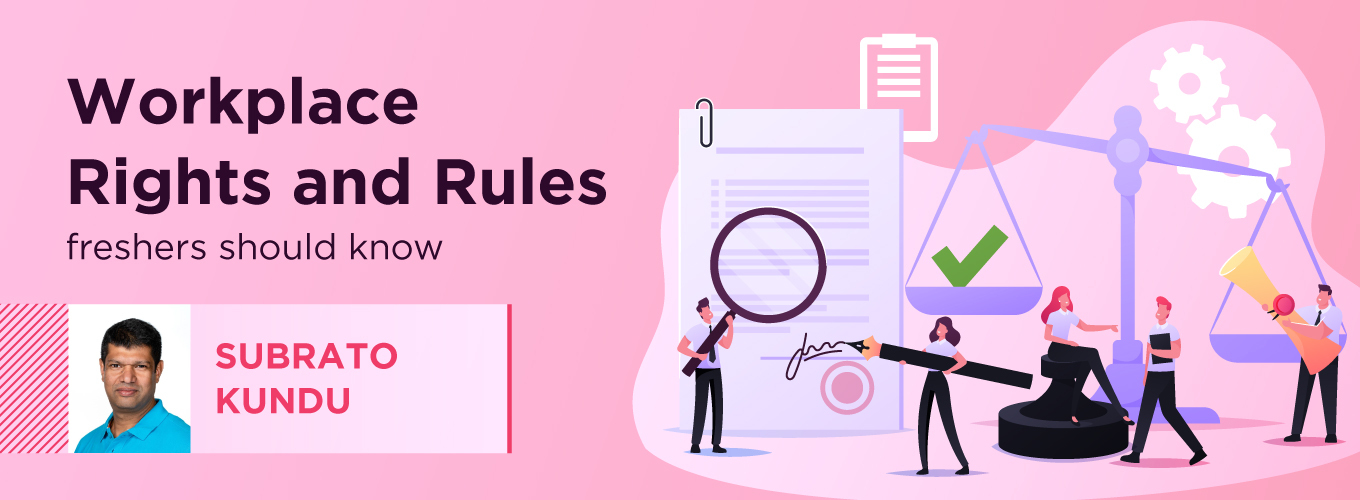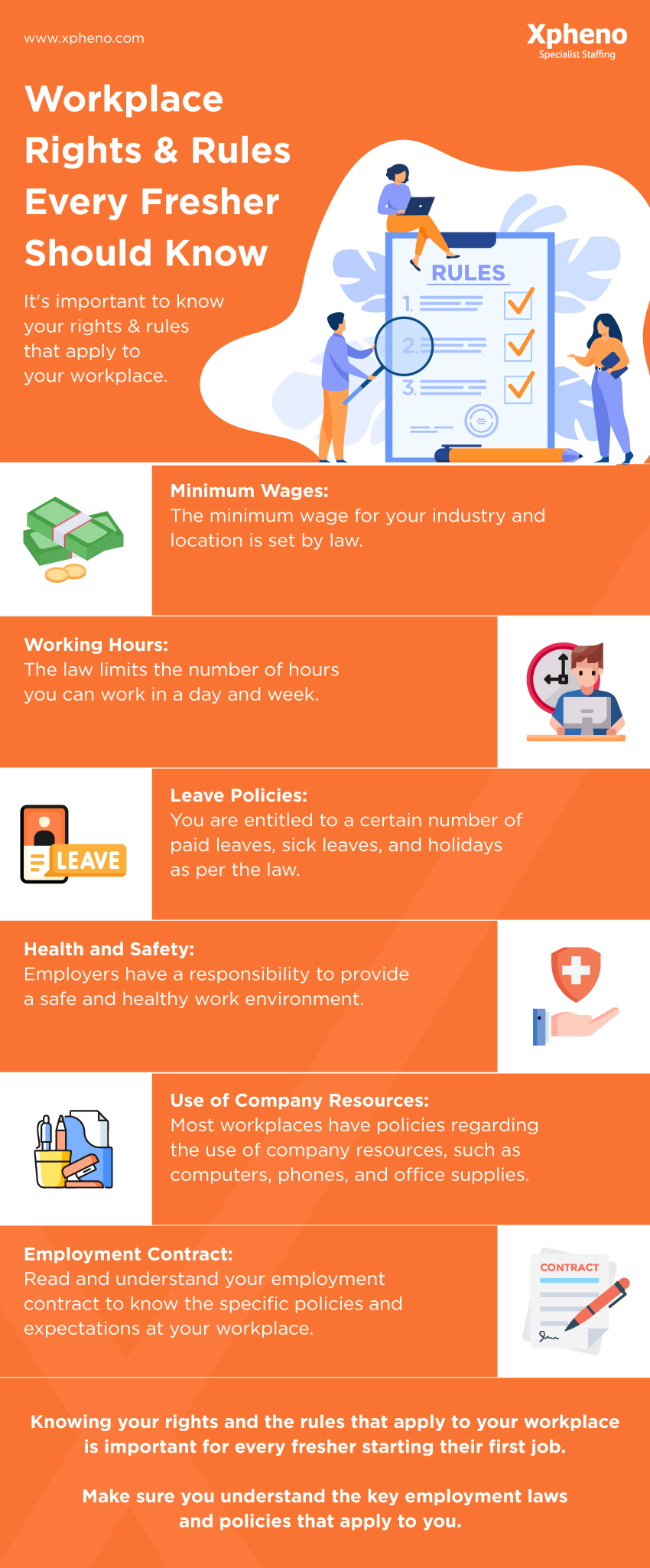Workplace Rights and Rules every fresher should know
Starting a new job can be daunting, especially if it is your first time. Freshers entering the corporate world often worry about navigating the various rules and expectations at the workplace. As we know, every enterprise has its own set of expectations and guidelines for its employees. These may be outlined in the employment contract, conveyed as company policies, or simply part of the company culture.
The transition from college to the workforce can be challenging because it can take some time to get used to the expectations and rules of the workplace. However, familiarizing yourself with the guidelines and expectations can help you become a successful and effective member of the team.
At the same time, as a fresher entering the workforce, it is critical that you know your rights and carefully examine the employment contract. Failing to do so can have serious consequences, such as being required to serve a lengthy notice period or being restricted from working in the same industry due to non-compete clauses. By taking the time to carefully review and understand your employment contract, you can avoid potential misunderstandings and difficulties. In this blog, I am going to discuss a few employment laws and workplace rules all freshers should know.
What is an Employment Contract?
An employment contract is a legally binding contract between an employer and an employee that outlines the terms and conditions of the employment relationship. The agreement typically includes details such as the job duties and responsibilities, working hours, salary and benefits, and any regulations on the employee’s behavior or use of confidential information. The contract may also include provisions related to annual leave, termination of employment, and other important terms.
The contract is used to establish a clear understanding between the employer and employee and to protect the interests of both parties. Hence, it’s crucial that you carefully examine the employment contract before you sign up for your new job. The contract is signed in various types of employment, including full-time, part-time, and fixed-term. In some cases, employers use a letter of intent for employment as a preliminary document, followed by a more detailed employment agreement for the employee.
Read and understand your employment contract to know the specific policies and expectations at your workplace. While paying attention to the set of rules and expectations in the specific policies and procedures that apply to your job, stay vigilant and make sure the policies don’t violate your rights as an employee as per the Indian Employment Laws.
Employment laws all freshers should know
Private sector employees in India are protected by various labor laws, including the Equal Remuneration Act, Payment of Bonus Act, Employees Provident Fund and Miscellaneous Provisions Act, Employees’ State Insurance Act, and Maternity Benefit Act.
Besides these, the Indian labour law also ensures that employees have the right to a safe and hygienic workplace, the right to reasonable working hours, and the right to receive benefits and incentives. An employee is entitled to all these rights and additional protection policies based on their specific terms of employment. These terms are written down in the employment contract.
Here are some of the important employment laws freshers working in the private sector should know:
Rights against discrimination in the workplace
According to the Indian Constitution, all citizens have the right to be treated equally and without discrimination. Article 16(2) specifically prohibits discrimination in employment or public office on the basis of religion, race, caste, gender, descent, place of birth, or residence. This means that no individual should be denied a job or public office solely on the basis of these factors.
India has labor laws in place to protect people from discrimination in the workplace, especially the marginalized groups such as people with disabilities, transgender individuals, and people with HIV. For instance, Maternity Benefit Act 1961, provides paid maternity leave to employees who give birth. These laws aim to create a more inclusive and supportive work environment for all employees.
Provident fund
The Employee Provident Fund (EPF) is a retirement savings plan for salaried employees in India. If you work for a company with more than 20 employees, your employer is required by law to register with EPF India. Both you and your employer will contribute a certain percentage of your salary to the fund. Pre-fixed interest on PF deposits and tax exemption on EPF funds are some of the benefits of having EPF. Besides retirement savings, it also works as an emergency fund. You can request to take money out of the EPF for certain emergencies or necessary expenses, but there are rules about how much you can take out and how long you have to work before you can take it out.
An employee who has a basic salary of more than Rs. 15,000 and has never previously been a member of the Employees’ Provident Fund (EPF) can choose not to join the scheme. Employees that choose to opt out after becoming a member of the EPF are no longer entitled to the employer contribution to the fund, nor the interest and tax deduction benefits. The only benefit is that they will be entitled to an increase in take-home salary
If your employer doesn’t pay their share of the contribution or doesn’t allow you to contribute, you can ask for help from a special organization called the Provident Fund Appellate Tribunal.
Fair Salary & Bonus for employees
The main purpose of employment is to receive fair compensation for one’s work. The Indian Constitution, specifically Article 39(d), guarantees equal pay for equal work, and The Equal Remuneration Act and The Payment of Wages Act further ensure that employees receive timely and fair remuneration.
If an employee is not being adequately compensated according to their employment agreement, they can seek resolution through the Labour Commissioner or by filing a civil suit for unpaid salary. It is illegal for an employer to pay an employee less than the legally mandated minimum wage.
Appropriate Working Hours and Overtime
All employees have the right to work in a safe and clean environment. The Factories Act and state-specific Shop and Establishment Acts protect the rights of workers and non-workmen. Adult workers are not allowed to work more than 9 hours a day or 48 hours a week, and they are entitled to receive double their regular wages for overtime.
Female workers can work from 6 am to 7 pm, but this can be extended to 9:30 pm if they are given permission and provided with safe transportation. Workers are also entitled to a weekly holiday and a half-hour break, and they are not allowed to work more than 12 hours in a single day.
Right to Leaves
In India, every organization needs to follow certain acts which regulate the conditions of work and employment such as Shops and Establishments Act and Factories Act, depending on the nature of the business. These acts define/regulate various aspects of employment, such as payment of wages, working hours, rest intervals, operating hours, holidays, overtime, annual leave, sick leave, casual leave, and employment conditions. According to this Act, employees have the right to receive paid time off for public holidays and other types of leave, such as casual leave, sick leave, and privilege leave.
The number of leaves that an employee is entitled to vary depending on the state in which the establishment is located. The leave policy of an organization should always be consistent with the leave provisions of the Act that the organization is following in the relevant state. The leaves provided to employees should be at par with the relevant Act.
Prevention of Sexual Harassment at workplace
The Sexual Harassment of Women at Workplace (Prevention, Prohibition and Redressal) Act, 2013 (POSH Act) protects women from sexual harassment in the workplace. This includes physical contact, requests for sexual favors, showing pornography, and other unwanted physical, verbal, or non-verbal conduct of a sexual nature.
Companies with 10 or more employees are required to have an Internal Committee in place to help victims of sexual harassment and to spread awareness regarding sexual harassment and how to address it. The committee should have a senior woman member as the Presiding Officer, two other employee members, and one external member. The Indian Penal Code punishes sexual harassment with imprisonment and fines.
Workplace rules freshers must know
Discipline, punctuality, and attention to detail, are some things that are expected at the job in any field. However, enterprises can have additional sets of expectations regarding what is appropriate behavior for people at work, depending on the work- culture. From your attire to your body language, all is included in your expression of professionalism.
By being informed and proactive, you can make informed decisions about your career and navigate the complexities of the employment relationship with confidence.
- Attendance and punctuality: Most workplaces expect employees to be punctual and present for their scheduled shifts. If you need to be absent or late, it’s important to inform your supervisor in advance.
- Dress code: Many workplaces have a dress code that outlines what is and isn’t appropriate to wear to work. It’s important to follow the dress code to maintain a professional appearance and fit in with the company culture.
- Confidentiality: It’s important to respect the confidentiality of your workplace, whether it’s about company information, client information, or the personal information of your colleagues.
- Health and safety: Employers have a responsibility to provide a safe and healthy work environment. Make sure you’re familiar with any health and safety policies and procedures and report any concerns you may have.
- Use of company resources: Most workplaces have policies regarding the use of company resources, such as computers, phones, and office supplies. Make sure you understand how to use these resources appropriately and responsibly.
- Communication: Good communication is essential in any workplace. Make sure you understand how to communicate effectively with your colleagues and supervisor, and be open to feedback.
The Bottomline
The transition from college to the workforce can be challenging as you may need time to adjust to the rules and expectations of the workplace. However, by being aware of these expectations from the beginning, you can avoid potential misunderstandings and difficulties. If you are feeling anxious about starting your first job in the corporate world, you are not alone. However, knowing about some of the workplace rules and your rights at the workplace, I hope I made it less intimidating. If you stay proactive to know about the set of rules and expectations of your job, you would be well on your way to become a successful individual and celebrated team player in your organization.











